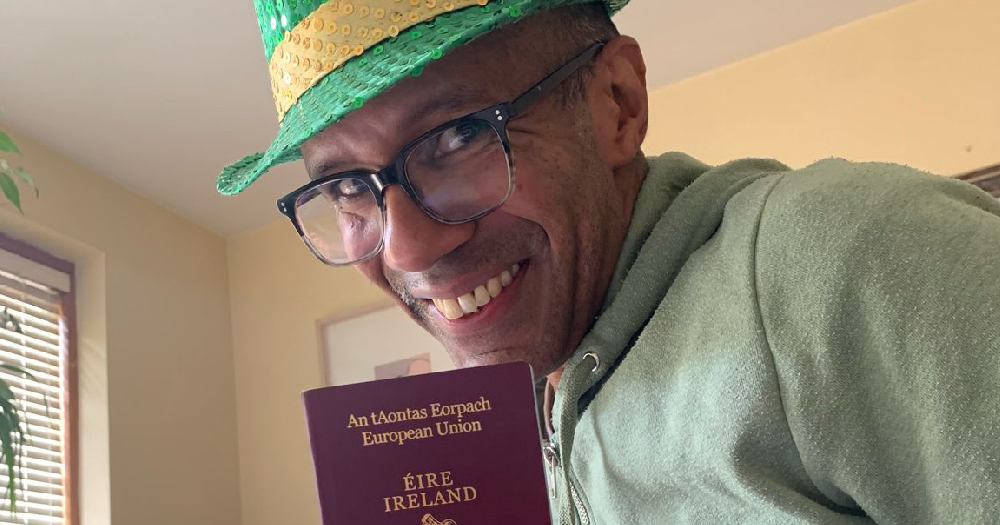Marlon Jimenez-Compton escaped from Venezuela in 2003 when he travelled to Ireland as a tourist. He applied to be an asylum seeker, in July of 2009 he became an Irish citizen. Marlon shared his story on LinkedIn and the post went viral with over a quarter of a million views.
To mark World Refugee Day, Marlon shared more details of his journey from being an asylum seeker to becoming an Irish citizen.
Venezuela is not a welcoming country for members of the LGBTQ+ community. “I was being discriminated against and harassed for being homosexual, I saw myself in situations that were risky against my safety.”
Such situations included when Marlon and his friend were harassed by police just for being two men alone together. He was kicked out of his accommodation because his landlord suspected him of being HIV Positive. “I said to myself, I had to leave this country because my future is not here.”
“I watched a documentary about Mary Robinson and Mary McAleese and how the two women were given the opportunity to be President of this country, one after the other. The two of them have been advocators for human rights, and gay rights, so that exacerbated my decision to come to Dublin”, Marlon said.
After his arrival in Dublin, Marlon applied to become an asylum seeker and his application was accepted. This meant that Marlon was stripped of his documents and given a GNIB card: “you are not Venezuelan, and you are not Irish but you belong to the State, and direct provision is part of the whole process.”
Marlon was told that he was going to be sent to a direct provision centre in Donegal, but he was saved from this fate by a doctor he met at the George. “We got chatting and I told him my situation and he felt sorry for me.
“The following week, I went back to the George, he was there. He said to me, ‘I have been thinking of you, and I would like to offer your accommodation.’” Marlon’s friend wrote a letter to the government telling them he was going to look after him.
“We are still friends, he came to my wedding, I went to his wedding, we are still in touch.”
This friend also introduced Marlon to his husband, John Compton. They met in the George in 2004. “We got into a relationship straight away but it was kind of risky because we didn’t know what was going to happen with my application.”
The application process for asylum seekers in Ireland is a long one. Marlon applied for asylum when he arrived in 2003, after 16 months of being in limbo he was granted asylum and became a political refugee. “The night I received a notification that I was allowed to stay in the country we cried.
“But I was in no man’s land. My nationality was up in limbo because I didn’t have a Venezuelan passport or an Irish passport.”
In 2009, Marlon applied for an Irish passport and it was granted to him. He became an Irish citizen. “I feel blessed to be given the opportunity to stay in this country to fully be who I am as a gay man. I feel Irish and I have a little bit of green in my blood.”
I asked Marlon what advice he would give to someone seeking asylum in Ireland. “It is not easy but it is better than where you are. No matter how tough the reality of being an asylum seeker in this country can be, it is still better than where we are from.
“I look back and in hindsight, I realized how inhumane [direct provision] is but, again, I felt blessed that I was given the opportunity to stay.
“Try to make yourself available to the community, contribute to society, because that is important. Those elements are going to make you grow as a person, make you grow as a citizen, and that will show when you go to the office to present your case.”
Spirasi is an Irish charity that helps refugees and asylum seekers that Marlon became involved with. “They opened the door for me to go in there and have a place to find refuge. To find friends and to find people in the same situation.”
As Marlon marks 18 years since he came to Ireland as an asylum seeker, there is another milestone for the Irish state who implemented the inhumane ‘temporary’ system of Direct Provision in 2000.
This World Refugee Day, GCN reaffirms calls to end Direct Provision with immediate effect.
To mark 21 years of Direct Provision in Ireland, Advocacy group Doras charted a timeline from its commencement in April 2000 to the February 2021 White Paper, which promised an end by 2024.
The advocacy group are also demanding that the Government takes immediate action towards implementing an international protection system.
If you have been affected by any of the topics raised in this article, the following resources are available:
© 2021 GCN (Gay Community News). All rights reserved.
Support GCN
GCN is a free, vital resource for Ireland’s LGBTQ+ community since 1988.
GCN is a trading name of National LGBT Federation CLG, a registered charity - Charity Number: 20034580.
GCN relies on the generous support of the community and allies to sustain the crucial work that we do. Producing GCN is costly, and, in an industry which has been hugely impacted by rising costs, we need your support to help sustain and grow this vital resource.
Supporting GCN for as little as €1.99 per month will help us continue our work as Ireland’s free, independent LGBTQ+ media.
